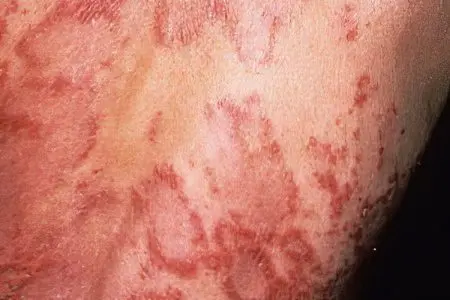
Systemic chronic lupus erythematosus is a disease that occurs as a result of a violation of autoimmune processes in the body involving all organs. The primary symptom of the disease are characteristic rashes on the skin.
Most often, women suffer from it, whose age varies from 15 to 45 years. Dry statistics indicate that systemic lupus is not a very common disease. So, out of 100 thousand people, only 50 people will develop this pathology.
Although lupus is classified as a chronic disease, it needs to be treated. Therapy allows you to alleviate the condition of a person during an exacerbation of the disease, as well as to stretch the period of remission as much as possible.
Causes and risk factors for systemic lupus erythematosus
It is generally accepted that the occurrence of systemic chronic lupus erythematosus is facilitated by a violation of immunoregulation, that is, the formation of abnormal antibodies (autoantibodies) in the body under the influence of genetic factors, which confirms the relationship of the disease with a hereditary deficiency of the immune system components.
Among the risk factors that can to some extent affect the occurrence of systemic lupus erythematosus, we can distinguish:
Frequent stress.
Excessive exposure to ultraviolet rays on the skin. In this regard, a strong tan is very dangerous, as well as sunburn.
Subcooling the body.
Excessive mental and physical stress.
Transferred viral diseases, or their chronic course. In this regard, measles, rubella, influenza, mumps, herpes, cytomegalovirus, Epstein-Barr virus can pose a danger.
Human immunodeficiency virus, or AIDS stage.
Disorders in the work of the immune system. The development of the disease can be affected by a lack of the C2 component in the complement system, which is a complex set of proteins that constantly circulate in the blood.
The risk of developing the disease increases if a person has a burdened heredity. This means that systemic lupus is more likely to occur when close relatives have suffered from the disease.
Circulation in the blood of such antigens as: B7, B35, HLA, All, DR2, DR3.
There are several risk factors that, according to scientists, can provoke the development of the disease, but the exact cause of the disease still remains unidentified. Modern science believes that lupus is a polyetiological disease, that is, it is caused by a number of reasons.
Although systemic chronic lupus erythematosus is diagnosed mostly in middle-aged women, the hormonal nature of the disease has not been confirmed. This factor contributes to the manifestation of the disease rather than serves as an impetus for its development. If a woman is diagnosed with systemic lupus erythematosus, she is not recommended to take oral contraceptives so as not to aggravate the manifestations of the disease.
[Video] Medical certificate – statistics, causes and main symptoms of systemic lupus:









